完形填空期末复习专项练习-2021-2022学年鲁教版英语八年级下册(word版,含答案)
文档属性
| 名称 | 完形填空期末复习专项练习-2021-2022学年鲁教版英语八年级下册(word版,含答案) | 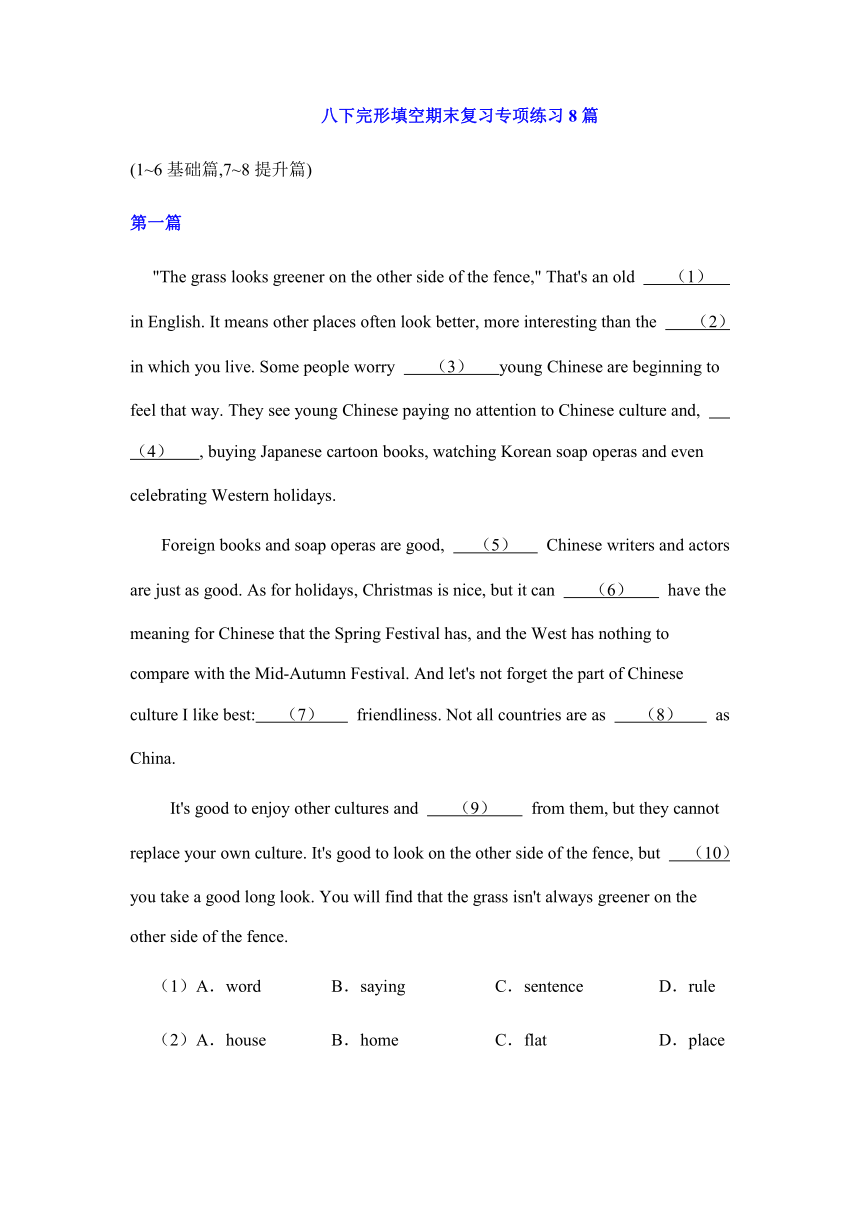 | |
| 格式 | docx | ||
| 文件大小 | 28.4KB | ||
| 资源类型 | 教案 | ||
| 版本资源 | 鲁教版 | ||
| 科目 | 英语 | ||
| 更新时间 | 2022-06-27 09:08:43 | ||
图片预览

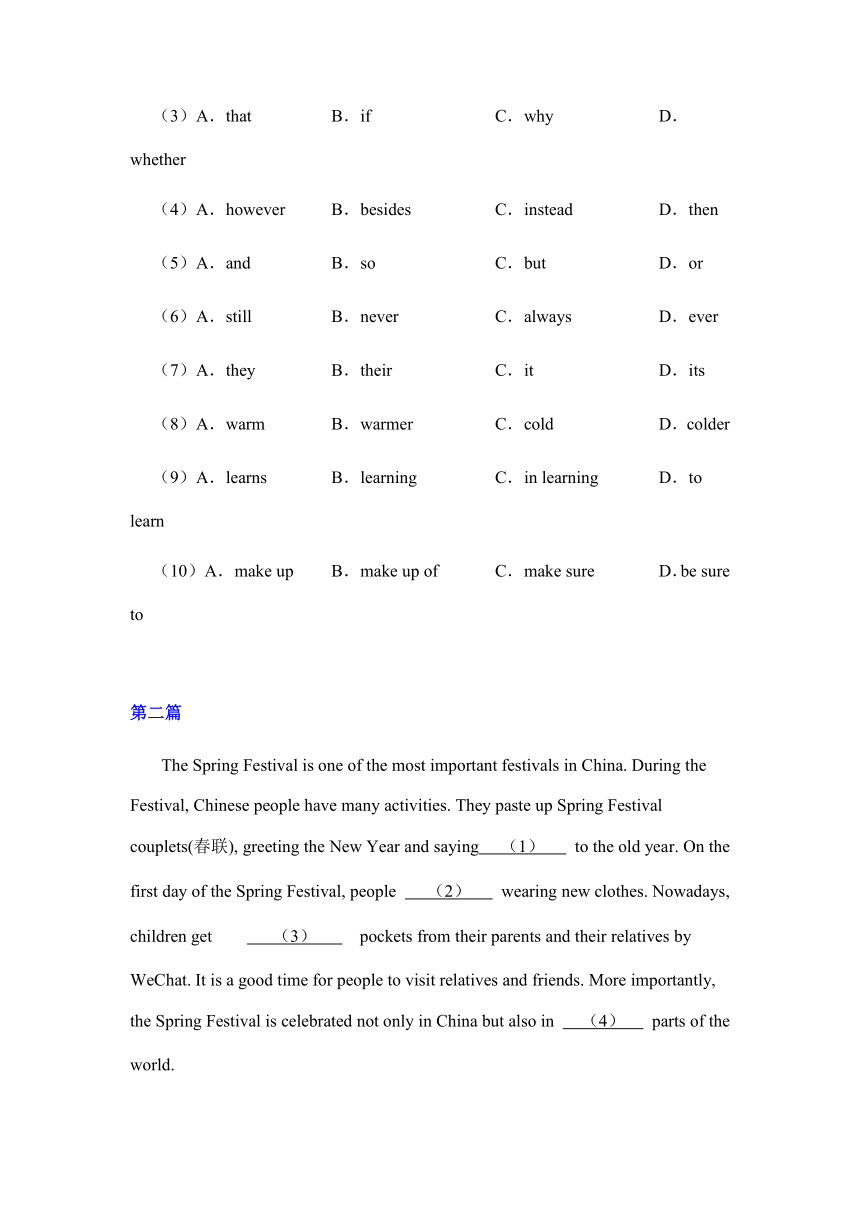
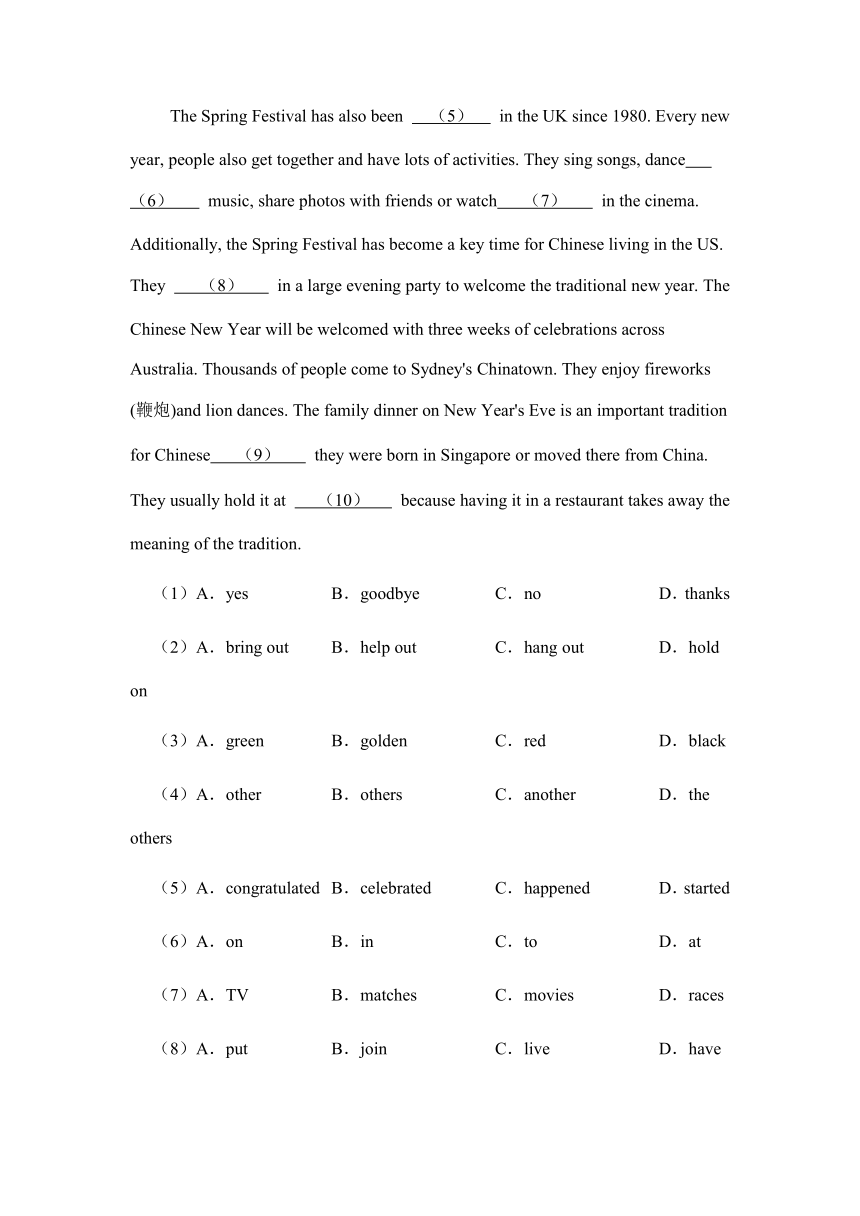
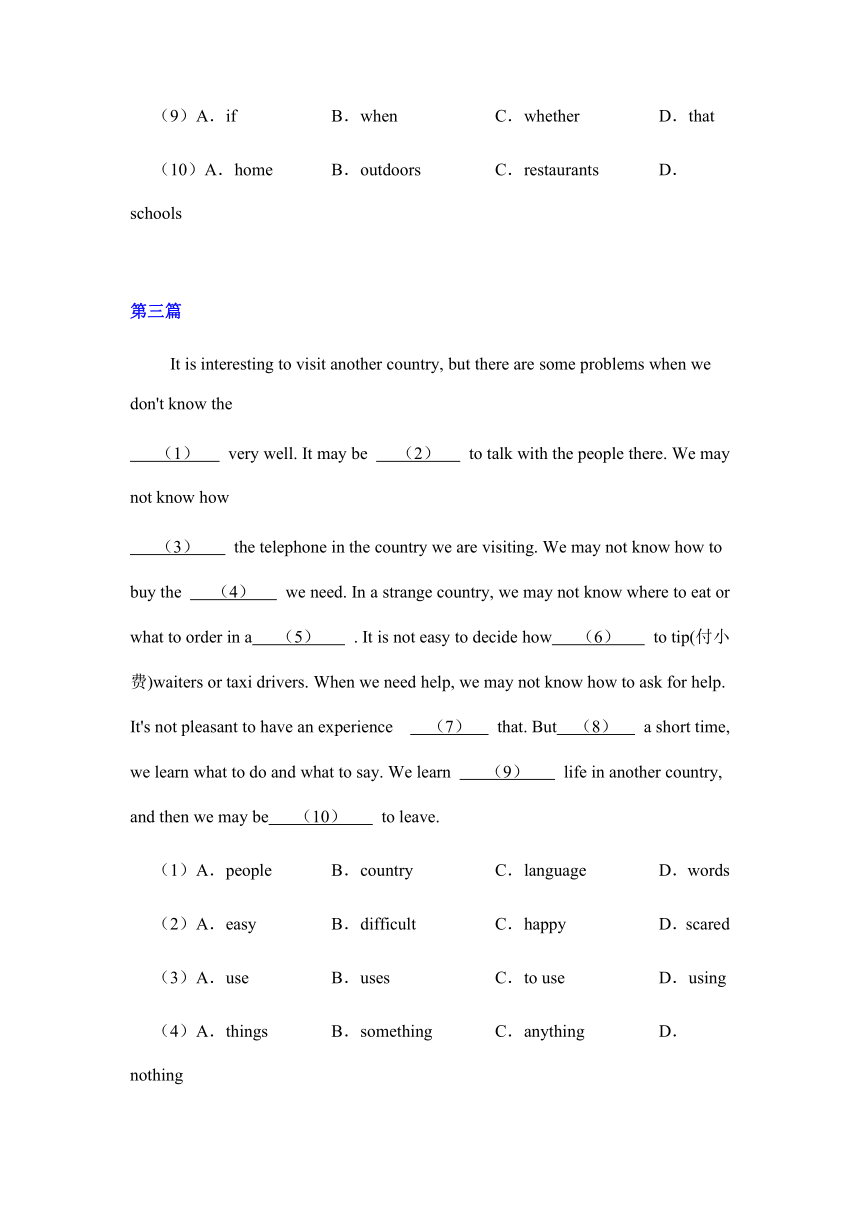
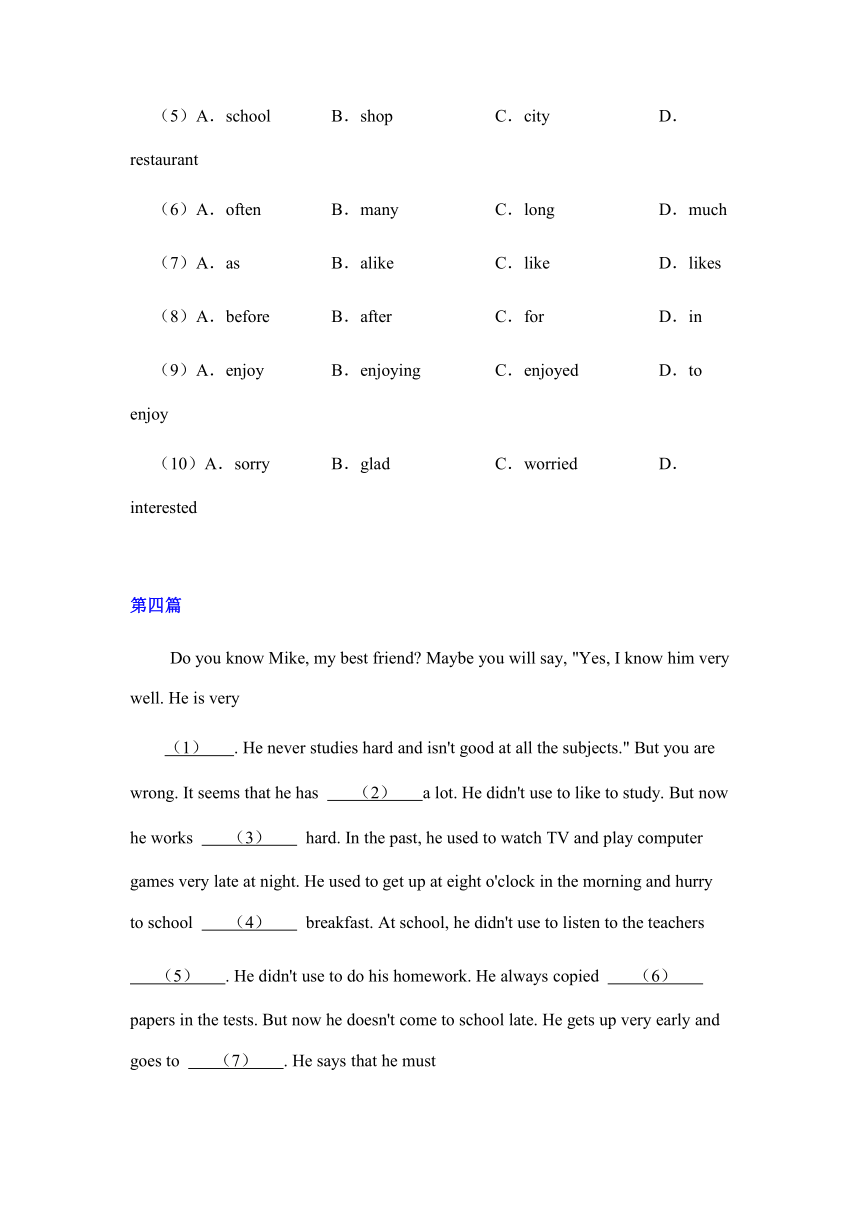
文档简介
八下完形填空期末复习专项练习8篇
(1~6基础篇,7~8提升篇)
第一篇
"The grass looks greener on the other side of the fence," That's an old (1) in English. It means other places often look better, more interesting than the (2) in which you live. Some people worry (3) young Chinese are beginning to feel that way. They see young Chinese paying no attention to Chinese culture and, (4) , buying Japanese cartoon books, watching Korean soap operas and even celebrating Western holidays.
Foreign books and soap operas are good, (5) Chinese writers and actors are just as good. As for holidays, Christmas is nice, but it can (6) have the meaning for Chinese that the Spring Festival has, and the West has nothing to compare with the Mid-Autumn Festival. And let's not forget the part of Chinese culture I like best: (7) friendliness. Not all countries are as (8) as China.
It's good to enjoy other cultures and (9) from them, but they cannot replace your own culture. It's good to look on the other side of the fence, but (10) you take a good long look. You will find that the grass isn't always greener on the other side of the fence.
(1)A.word B.saying C.sentence D.rule
(2)A.house B.home C.flat D.place
(3)A.that B.if C.why D.whether
(4)A.however B.besides C.instead D.then
(5)A.and B.so C.but D.or
(6)A.still B.never C.always D.ever
(7)A.they B.their C.it D.its
(8)A.warm B.warmer C.cold D.colder
(9)A.learns B.learning C.in learning D.to learn
(10)A.make up B.make up of C.make sure D.be sure to
第二篇
The Spring Festival is one of the most important festivals in China. During the Festival, Chinese people have many activities. They paste up Spring Festival couplets(春联), greeting the New Year and saying (1) to the old year. On the first day of the Spring Festival, people (2) wearing new clothes. Nowadays, children get (3) pockets from their parents and their relatives by WeChat. It is a good time for people to visit relatives and friends. More importantly, the Spring Festival is celebrated not only in China but also in (4) parts of the world.
The Spring Festival has also been (5) in the UK since 1980. Every new year, people also get together and have lots of activities. They sing songs, dance (6) music, share photos with friends or watch (7) in the cinema. Additionally, the Spring Festival has become a key time for Chinese living in the US. They (8) in a large evening party to welcome the traditional new year. The Chinese New Year will be welcomed with three weeks of celebrations across Australia. Thousands of people come to Sydney's Chinatown. They enjoy fireworks (鞭炮)and lion dances. The family dinner on New Year's Eve is an important tradition for Chinese (9) they were born in Singapore or moved there from China. They usually hold it at (10) because having it in a restaurant takes away the meaning of the tradition.
(1)A.yes B.goodbye C.no D.thanks
(2)A.bring out B.help out C.hang out D.hold on
(3)A.green B.golden C.red D.black
(4)A.other B.others C.another D.the others
(5)A.congratulated B.celebrated C.happened D.started
(6)A.on B.in C.to D.at
(7)A.TV B.matches C.movies D.races
(8)A.put B.join C.live D.have
(9)A.if B.when C.whether D.that
(10)A.home B.outdoors C.restaurants D.schools
第三篇
It is interesting to visit another country, but there are some problems when we don't know the
(1) very well. It may be (2) to talk with the people there. We may not know how
(3) the telephone in the country we are visiting. We may not know how to buy the (4) we need. In a strange country, we may not know where to eat or what to order in a (5) . It is not easy to decide how (6) to tip(付小费)waiters or taxi drivers. When we need help, we may not know how to ask for help. It's not pleasant to have an experience (7) that. But (8) a short time, we learn what to do and what to say. We learn (9) life in another country, and then we may be (10) to leave.
(1)A.people B.country C.language D.words
(2)A.easy B.difficult C.happy D.scared
(3)A.use B.uses C.to use D.using
(4)A.things B.something C.anything D.nothing
(5)A.school B.shop C.city D.restaurant
(6)A.often B.many C.long D.much
(7)A.as B.alike C.like D.likes
(8)A.before B.after C.for D.in
(9)A.enjoy B.enjoying C.enjoyed D.to enjoy
(10)A.sorry B.glad C.worried D.interested
第四篇
Do you know Mike, my best friend Maybe you will say, "Yes, I know him very well. He is very
(1) . He never studies hard and isn't good at all the subjects." But you are wrong. It seems that he has (2) a lot. He didn't use to like to study. But now he works (3) hard. In the past, he used to watch TV and play computer games very late at night. He used to get up at eight o'clock in the morning and hurry to school (4) breakfast. At school, he didn't use to listen to the teachers
(5) . He didn't use to do his homework. He always copied (6) papers in the tests. But now he doesn't come to school late. He gets up very early and goes to (7) . He says that he must
(8) his health. He walks to school after breakfast. At school, he often studies with a group and asks other students for help when he has (9) . His classmates usually help him with homework. He has made great (10) this term and he got an A in a test last week.
(1)A.active B.lonely C.lazy D.silent
(2)A.changed B.spent C.worked D.spoke
(3)A.exactly B.really C.quickly D.patiently
(4)A.without B.with C.for D.after
(5)A.early B.carefully C.quietly D.carelessly
(6)A.another's B.the other's C.others' D.others
(7)A.movies B.shop C.play D.exercise
(8)A.look for B.look up C.look through D.look after
(9)A.trouble B.interest C.fun D.worries
(10)A.mistakes B.progress C.decisions D.friends
第五篇
Every April, there is a special day in China. It is called Qingming Festival, also called Tomb-Sweeping Day. On that day, people (1) and honor (纪念)their ancestors (祖先).
Qingming is a(n) (2) Chinese festival. It has a long history. It began over 2, 000 years ago. A famous poem (3) the Tang Dynasty poet Du Mu describes the day:" Rains fall heavily as Qingming comes, and passers-by(行人)with lowered sprits go."
Tomb-Sweeping Day has been a public (4) on the Chinese mainland(中国大陆)since 2008. On this day, (5) bring flowers, food and wine to their ancestors' tombs (坟墓). They put food like cakes and fruits in front of the tombs. After that, they (6) the dirt off the tombs and remember their dead family members.
(7) do Chinese people do this That's because people think that visiting tombs to (8) respect (尊重)to their dead family members.
However, Tomb-Sweeping Day is not only about this. During that time, the weather is becoming
(9) . People are also able to garden (从事园艺)and enjoy outdoor activities. Families often (10) for outings (远足)or fly kites at this time.
(1)A.remember B.meet C.see D.find
(2)A.popular B.famous C.traditional D.unhappy
(3)A.for B.by C.with D.as
(4)A.weekend B.weekday C.journey D.holiday
(5)A.classes B.families C.friends D.groups
(6)A.turn B.keep C.sweep D.go
(7)A.Why B.When C.Where D.Who
(8)A.bring B.show C.make D.take
(9)A.warmer B.colder C.cooler D.shorter
(10)A.have fun B.work hard C.pull together D.get together
第六篇
Mr. Brown lives in a village. He has got a big family and a strong (1) . His farm is small and he is often (2) in winter. So he goes to the city and finds work there.
Once he stayed there for about two months. When New Year was coming, he (3) home to see his wife and children. On his way home, something was wrong with his eyes. When he was knocking at the door, his dog came out and bit him. His wife hurried to drive (4) away. The next morning he went to see (5) .The doctor looked over his eyes carefully and gave him some medicine. Before he (6) ,he told the doctor about his dog. When the doctor heard this, he began to (7) and said, “Maybe something is wrong with (8) eyes, too, I think.”
When he got home, he told his wife about it. The woman said, “I (9) it's true. If a thief comes into our house, it won't see him and he'll steal something here.”
Mr. Brown thought his wife was (10) .He had to make his dog take his medicine instead.
(1)A.child B.dog C.wife D.son
(2)A.free B.busy C.safe D.worried
(3)A.reached B.comes C.goes D.returned
(4)A.her husband B.the dog C.the thief D.their children
(5)A.his dog B.his wife C.a doctor D.his friend
(6)A.got home B.left C.went D.came
(7)A.cry B.write C.laugh D.work
(8)A.your dog's B.your C.your wife's D.your children's
(9)A.am afraid B.am sorry C.don't think D.agree
(10)A.ill B.wrong C.unhappy D.right
第七篇
Ashley was outspoken, fashionable, and the" Queen Bee" in my school.
I looked up to her and idolized her. I listened to the music she listened to, wore the clothes she wore. I even took art class though I had really wanted to take theatre. I finally fitted in (1) group.
One day, I skipped out of my last class a few minutes early to (2) seats for our group at the dining hall. Concentrating on my homework, I didn't notice they had sat down behind me. Before I could say a word, I realized what they were (3) .
I listened silently." She's such a loser," one girl said.
Another girl added," Ashley, she (4) follows you, trying to copy you."
"I wish she would leave us alone. We were in the same summer school and now she thinks we're best friends." The once familiar voice sounded so (5) and strange.
I was mortified. My hands were shaking. I couldn't help crying (6) . I felt heart-broken for the very first time. How did this happen I (7) we were friends.
I ran home. My mother just held me while I sobbed for hours. The advice she gave was so
(8) , and I had heard it a million times." Just be yourself and people will like you for (9) you are." This time it became so profound. Then and there I (10) to find myself back. That was exactly what I did.
Over the next month, I went through a lot of (11) . I bought new clothes that I wanted to wear. I no longer went to art class (12) them, and took theatre. I began making new friends. I developed my own (13) and never again followed the crowd.
I had an amazing school year. (14) I look back, I think it was the year when I discovered the person I was going to be. Despite the pain I felt that day, it was a (15) they had given me.
(1)A.my B.her C.his D.our
(2)A.get B.buy C.rent D.move
(3)A.thinking about B.talking about C.waiting for D.asking for
(4)A.once B.always C.hardly D.never
(5)A.serious B.special C.weak D.cold
(6)A.sadly B.shyly C.excitedly D.nervously
(7)A.found B.admitted C.realized D.thought
(8)A.funny B.simple C.useful D.different
(9)A.where B.what C.how D.who
(10)A.failed B.forgot C.decided D.continued
(11)A.pains B.doubts C.changes D.troubles
(12)A.with B.about C.against D.without
(13)A.skills B.habits C.projects D.opinions
(14)A.Before B.Unless C.When D.If
(15)A.gift B.choice C.promise D.surprise
第八篇
Since the earliest times, people have looked up at the stars, the moon and the planets. Today people use modern machines (1) at the sky. This is very different from the situation (2) years ago when people could only use their eyes. Perhaps they dreamed of (3) the universe.
When did humans first go into space The story began not so very long ago, (4) the first astronauts were not people—they were animals.
Scientists wanted to make travelling to space as (5) as possible for humans. So they decided to experiment with animals and test (6) in spaceflights. Insects, mice, frogs, dogs and monkeys were some of the animals (7) first went into space. Many of them (8) , but they helped to make space travel safer for humans. For their great service, we (9) forget these animals.
Albert Ⅱ was the first monkey to go into space in 1949. Sadly he died (10) his spaceship landed back on Earth.
(11) , the result was different for Ham the Monkey. His story ended happily when he returned to earth (12) very good health.
Scientists wanted to know the answer to the important question: could (13) animal like Ham do the same things in space as he could do on Earth The answer came when Ham (14) into space in 1961. Yes, he did everything well and lived for (15) 16 years.
(1)A.look B.to look C.looking D.looked
(2)A.thousand B.thousands C.thousand of D.thousands of
(3)A.explore B.to explore C.explored D.exploring
(4)A.as B.or C.but D.so
(5)A.safe B.safer C.safest D.the safest
(6)A.they B.them C.their D.theirs
(7)A.whom B.what C.that D.whose
(8)A.die B.died C.have died D.will die
(9)A.shouldn't B.may not C.don't have to D.needn't
(10)A.if B.because C.after D.since
(11)A.Luck B.Lucky C.Luckier D.Luckily
(12)A.at B.on C.in D.for
(13)A.a B.an C.the D./
(14)A.send B.sent C.is sent D.was sent
(15)A.another B.other C.others D.the others
Keys
第一篇(1)B;(2)D;(3)A;(4)C;(5)C;(6)B;(7)D;(8)A;(9)D;(10)C
第二篇(1)B;(2)C;(3)C;(4)A;(5)B;(6)C;(7)C;(8)B;(9)C;(10)A
第三篇(1)C;(2)B;(3)C;(4)A;(5)D;(6)D;(7)C;(8)B;(9)D;(10)B
第四篇(1)C;(2)A;(3)B;(4)A;(5)B;(6)C;(7)D;(8)D;(9)A;(10)B
第五篇(1)A;(2)C;(3)B;(4)D;(5)B;(6)C;(7)A;(8)B;(9)A;(10)D
第六篇(1)B;(2)A;(3)D;(4)B;(5)C;(6)B;(7)C;(8)A;(9)A;(10)D
第七篇(1)B;(2)A;(3)B;(4)B;(5)D;(6)A;(7)D;(8)B;(9)D;(10)C;(11)C;(12)A;(13)D;(14)C;(15)A
第八篇(1)B;(2)D;(3)D;(4)C;(5)A;(6)B;(7)C;(8)B;(9)A;(10)C;(11)D;(12)C;(13)B;(14)D;(15)A
(1~6基础篇,7~8提升篇)
第一篇
"The grass looks greener on the other side of the fence," That's an old (1) in English. It means other places often look better, more interesting than the (2) in which you live. Some people worry (3) young Chinese are beginning to feel that way. They see young Chinese paying no attention to Chinese culture and, (4) , buying Japanese cartoon books, watching Korean soap operas and even celebrating Western holidays.
Foreign books and soap operas are good, (5) Chinese writers and actors are just as good. As for holidays, Christmas is nice, but it can (6) have the meaning for Chinese that the Spring Festival has, and the West has nothing to compare with the Mid-Autumn Festival. And let's not forget the part of Chinese culture I like best: (7) friendliness. Not all countries are as (8) as China.
It's good to enjoy other cultures and (9) from them, but they cannot replace your own culture. It's good to look on the other side of the fence, but (10) you take a good long look. You will find that the grass isn't always greener on the other side of the fence.
(1)A.word B.saying C.sentence D.rule
(2)A.house B.home C.flat D.place
(3)A.that B.if C.why D.whether
(4)A.however B.besides C.instead D.then
(5)A.and B.so C.but D.or
(6)A.still B.never C.always D.ever
(7)A.they B.their C.it D.its
(8)A.warm B.warmer C.cold D.colder
(9)A.learns B.learning C.in learning D.to learn
(10)A.make up B.make up of C.make sure D.be sure to
第二篇
The Spring Festival is one of the most important festivals in China. During the Festival, Chinese people have many activities. They paste up Spring Festival couplets(春联), greeting the New Year and saying (1) to the old year. On the first day of the Spring Festival, people (2) wearing new clothes. Nowadays, children get (3) pockets from their parents and their relatives by WeChat. It is a good time for people to visit relatives and friends. More importantly, the Spring Festival is celebrated not only in China but also in (4) parts of the world.
The Spring Festival has also been (5) in the UK since 1980. Every new year, people also get together and have lots of activities. They sing songs, dance (6) music, share photos with friends or watch (7) in the cinema. Additionally, the Spring Festival has become a key time for Chinese living in the US. They (8) in a large evening party to welcome the traditional new year. The Chinese New Year will be welcomed with three weeks of celebrations across Australia. Thousands of people come to Sydney's Chinatown. They enjoy fireworks (鞭炮)and lion dances. The family dinner on New Year's Eve is an important tradition for Chinese (9) they were born in Singapore or moved there from China. They usually hold it at (10) because having it in a restaurant takes away the meaning of the tradition.
(1)A.yes B.goodbye C.no D.thanks
(2)A.bring out B.help out C.hang out D.hold on
(3)A.green B.golden C.red D.black
(4)A.other B.others C.another D.the others
(5)A.congratulated B.celebrated C.happened D.started
(6)A.on B.in C.to D.at
(7)A.TV B.matches C.movies D.races
(8)A.put B.join C.live D.have
(9)A.if B.when C.whether D.that
(10)A.home B.outdoors C.restaurants D.schools
第三篇
It is interesting to visit another country, but there are some problems when we don't know the
(1) very well. It may be (2) to talk with the people there. We may not know how
(3) the telephone in the country we are visiting. We may not know how to buy the (4) we need. In a strange country, we may not know where to eat or what to order in a (5) . It is not easy to decide how (6) to tip(付小费)waiters or taxi drivers. When we need help, we may not know how to ask for help. It's not pleasant to have an experience (7) that. But (8) a short time, we learn what to do and what to say. We learn (9) life in another country, and then we may be (10) to leave.
(1)A.people B.country C.language D.words
(2)A.easy B.difficult C.happy D.scared
(3)A.use B.uses C.to use D.using
(4)A.things B.something C.anything D.nothing
(5)A.school B.shop C.city D.restaurant
(6)A.often B.many C.long D.much
(7)A.as B.alike C.like D.likes
(8)A.before B.after C.for D.in
(9)A.enjoy B.enjoying C.enjoyed D.to enjoy
(10)A.sorry B.glad C.worried D.interested
第四篇
Do you know Mike, my best friend Maybe you will say, "Yes, I know him very well. He is very
(1) . He never studies hard and isn't good at all the subjects." But you are wrong. It seems that he has (2) a lot. He didn't use to like to study. But now he works (3) hard. In the past, he used to watch TV and play computer games very late at night. He used to get up at eight o'clock in the morning and hurry to school (4) breakfast. At school, he didn't use to listen to the teachers
(5) . He didn't use to do his homework. He always copied (6) papers in the tests. But now he doesn't come to school late. He gets up very early and goes to (7) . He says that he must
(8) his health. He walks to school after breakfast. At school, he often studies with a group and asks other students for help when he has (9) . His classmates usually help him with homework. He has made great (10) this term and he got an A in a test last week.
(1)A.active B.lonely C.lazy D.silent
(2)A.changed B.spent C.worked D.spoke
(3)A.exactly B.really C.quickly D.patiently
(4)A.without B.with C.for D.after
(5)A.early B.carefully C.quietly D.carelessly
(6)A.another's B.the other's C.others' D.others
(7)A.movies B.shop C.play D.exercise
(8)A.look for B.look up C.look through D.look after
(9)A.trouble B.interest C.fun D.worries
(10)A.mistakes B.progress C.decisions D.friends
第五篇
Every April, there is a special day in China. It is called Qingming Festival, also called Tomb-Sweeping Day. On that day, people (1) and honor (纪念)their ancestors (祖先).
Qingming is a(n) (2) Chinese festival. It has a long history. It began over 2, 000 years ago. A famous poem (3) the Tang Dynasty poet Du Mu describes the day:" Rains fall heavily as Qingming comes, and passers-by(行人)with lowered sprits go."
Tomb-Sweeping Day has been a public (4) on the Chinese mainland(中国大陆)since 2008. On this day, (5) bring flowers, food and wine to their ancestors' tombs (坟墓). They put food like cakes and fruits in front of the tombs. After that, they (6) the dirt off the tombs and remember their dead family members.
(7) do Chinese people do this That's because people think that visiting tombs to (8) respect (尊重)to their dead family members.
However, Tomb-Sweeping Day is not only about this. During that time, the weather is becoming
(9) . People are also able to garden (从事园艺)and enjoy outdoor activities. Families often (10) for outings (远足)or fly kites at this time.
(1)A.remember B.meet C.see D.find
(2)A.popular B.famous C.traditional D.unhappy
(3)A.for B.by C.with D.as
(4)A.weekend B.weekday C.journey D.holiday
(5)A.classes B.families C.friends D.groups
(6)A.turn B.keep C.sweep D.go
(7)A.Why B.When C.Where D.Who
(8)A.bring B.show C.make D.take
(9)A.warmer B.colder C.cooler D.shorter
(10)A.have fun B.work hard C.pull together D.get together
第六篇
Mr. Brown lives in a village. He has got a big family and a strong (1) . His farm is small and he is often (2) in winter. So he goes to the city and finds work there.
Once he stayed there for about two months. When New Year was coming, he (3) home to see his wife and children. On his way home, something was wrong with his eyes. When he was knocking at the door, his dog came out and bit him. His wife hurried to drive (4) away. The next morning he went to see (5) .The doctor looked over his eyes carefully and gave him some medicine. Before he (6) ,he told the doctor about his dog. When the doctor heard this, he began to (7) and said, “Maybe something is wrong with (8) eyes, too, I think.”
When he got home, he told his wife about it. The woman said, “I (9) it's true. If a thief comes into our house, it won't see him and he'll steal something here.”
Mr. Brown thought his wife was (10) .He had to make his dog take his medicine instead.
(1)A.child B.dog C.wife D.son
(2)A.free B.busy C.safe D.worried
(3)A.reached B.comes C.goes D.returned
(4)A.her husband B.the dog C.the thief D.their children
(5)A.his dog B.his wife C.a doctor D.his friend
(6)A.got home B.left C.went D.came
(7)A.cry B.write C.laugh D.work
(8)A.your dog's B.your C.your wife's D.your children's
(9)A.am afraid B.am sorry C.don't think D.agree
(10)A.ill B.wrong C.unhappy D.right
第七篇
Ashley was outspoken, fashionable, and the" Queen Bee" in my school.
I looked up to her and idolized her. I listened to the music she listened to, wore the clothes she wore. I even took art class though I had really wanted to take theatre. I finally fitted in (1) group.
One day, I skipped out of my last class a few minutes early to (2) seats for our group at the dining hall. Concentrating on my homework, I didn't notice they had sat down behind me. Before I could say a word, I realized what they were (3) .
I listened silently." She's such a loser," one girl said.
Another girl added," Ashley, she (4) follows you, trying to copy you."
"I wish she would leave us alone. We were in the same summer school and now she thinks we're best friends." The once familiar voice sounded so (5) and strange.
I was mortified. My hands were shaking. I couldn't help crying (6) . I felt heart-broken for the very first time. How did this happen I (7) we were friends.
I ran home. My mother just held me while I sobbed for hours. The advice she gave was so
(8) , and I had heard it a million times." Just be yourself and people will like you for (9) you are." This time it became so profound. Then and there I (10) to find myself back. That was exactly what I did.
Over the next month, I went through a lot of (11) . I bought new clothes that I wanted to wear. I no longer went to art class (12) them, and took theatre. I began making new friends. I developed my own (13) and never again followed the crowd.
I had an amazing school year. (14) I look back, I think it was the year when I discovered the person I was going to be. Despite the pain I felt that day, it was a (15) they had given me.
(1)A.my B.her C.his D.our
(2)A.get B.buy C.rent D.move
(3)A.thinking about B.talking about C.waiting for D.asking for
(4)A.once B.always C.hardly D.never
(5)A.serious B.special C.weak D.cold
(6)A.sadly B.shyly C.excitedly D.nervously
(7)A.found B.admitted C.realized D.thought
(8)A.funny B.simple C.useful D.different
(9)A.where B.what C.how D.who
(10)A.failed B.forgot C.decided D.continued
(11)A.pains B.doubts C.changes D.troubles
(12)A.with B.about C.against D.without
(13)A.skills B.habits C.projects D.opinions
(14)A.Before B.Unless C.When D.If
(15)A.gift B.choice C.promise D.surprise
第八篇
Since the earliest times, people have looked up at the stars, the moon and the planets. Today people use modern machines (1) at the sky. This is very different from the situation (2) years ago when people could only use their eyes. Perhaps they dreamed of (3) the universe.
When did humans first go into space The story began not so very long ago, (4) the first astronauts were not people—they were animals.
Scientists wanted to make travelling to space as (5) as possible for humans. So they decided to experiment with animals and test (6) in spaceflights. Insects, mice, frogs, dogs and monkeys were some of the animals (7) first went into space. Many of them (8) , but they helped to make space travel safer for humans. For their great service, we (9) forget these animals.
Albert Ⅱ was the first monkey to go into space in 1949. Sadly he died (10) his spaceship landed back on Earth.
(11) , the result was different for Ham the Monkey. His story ended happily when he returned to earth (12) very good health.
Scientists wanted to know the answer to the important question: could (13) animal like Ham do the same things in space as he could do on Earth The answer came when Ham (14) into space in 1961. Yes, he did everything well and lived for (15) 16 years.
(1)A.look B.to look C.looking D.looked
(2)A.thousand B.thousands C.thousand of D.thousands of
(3)A.explore B.to explore C.explored D.exploring
(4)A.as B.or C.but D.so
(5)A.safe B.safer C.safest D.the safest
(6)A.they B.them C.their D.theirs
(7)A.whom B.what C.that D.whose
(8)A.die B.died C.have died D.will die
(9)A.shouldn't B.may not C.don't have to D.needn't
(10)A.if B.because C.after D.since
(11)A.Luck B.Lucky C.Luckier D.Luckily
(12)A.at B.on C.in D.for
(13)A.a B.an C.the D./
(14)A.send B.sent C.is sent D.was sent
(15)A.another B.other C.others D.the others
Keys
第一篇(1)B;(2)D;(3)A;(4)C;(5)C;(6)B;(7)D;(8)A;(9)D;(10)C
第二篇(1)B;(2)C;(3)C;(4)A;(5)B;(6)C;(7)C;(8)B;(9)C;(10)A
第三篇(1)C;(2)B;(3)C;(4)A;(5)D;(6)D;(7)C;(8)B;(9)D;(10)B
第四篇(1)C;(2)A;(3)B;(4)A;(5)B;(6)C;(7)D;(8)D;(9)A;(10)B
第五篇(1)A;(2)C;(3)B;(4)D;(5)B;(6)C;(7)A;(8)B;(9)A;(10)D
第六篇(1)B;(2)A;(3)D;(4)B;(5)C;(6)B;(7)C;(8)A;(9)A;(10)D
第七篇(1)B;(2)A;(3)B;(4)B;(5)D;(6)A;(7)D;(8)B;(9)D;(10)C;(11)C;(12)A;(13)D;(14)C;(15)A
第八篇(1)B;(2)D;(3)D;(4)C;(5)A;(6)B;(7)C;(8)B;(9)A;(10)C;(11)D;(12)C;(13)B;(14)D;(15)A
同课章节目录
